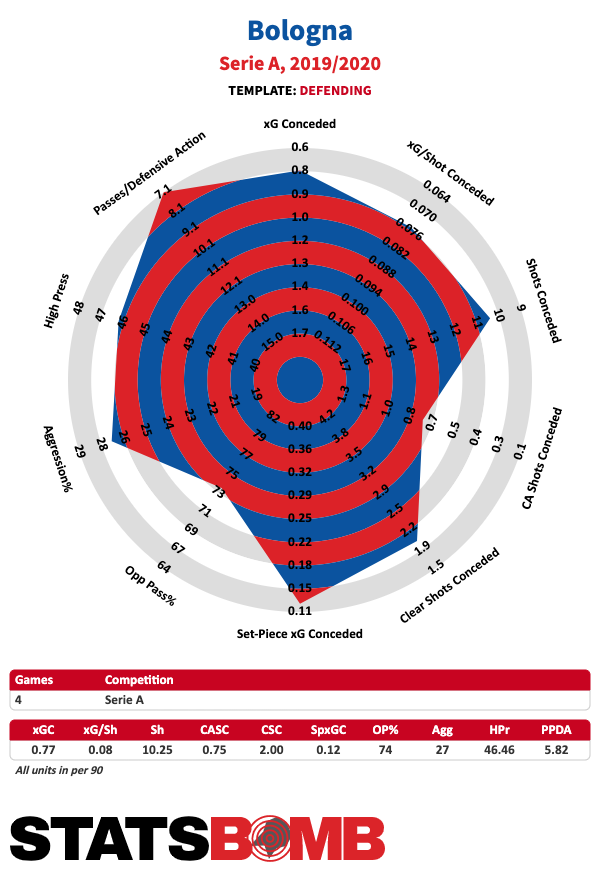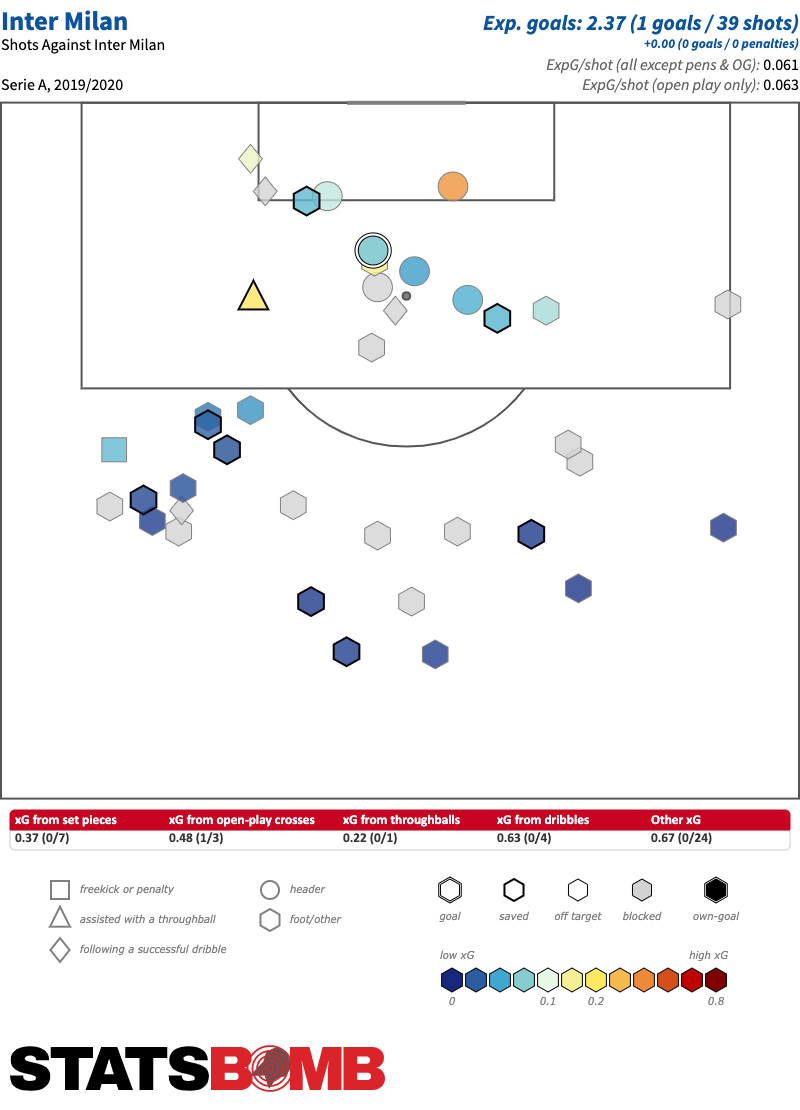Remember the old catenaccio cliché? The first four matchdays of the Serie A saw 123 goals in 40 games, the start with the most goals since 1950/51. A total of 24 games ended with at least three goals scored, 14 with at least four. In the five major European leagues, only the Bundesliga has a higher goal per game average (3.24) than Serie A (3.08). The fight for the title seems more open than ever and matches have been full of goals, open till the last minute and really entertaining to watch. But, other than there have been loads of goals, what do the numbers tell us? Four games is a tiny sample in football in which the schedule could introduce a significant bias and it is still too early to judge the many teams that have changed manager during the summer. Despite their dubious statistical significance, there are already some early trends that deserve to be highlighted and that in some cases are going on since last season.
Bologna are the best team in the league, but not for long
Unfortunately for them, in recent times Bologna have regained the spotlight after the announcement of the medical condition of their coach Sinisa Mihajlović. Despite his illness, the Serbian coach decided to keep his job and continue building on the excellent work he did last season. Last season, Mihajlovic replaced Filippo Inzaghi as Bologna coach in January, when they were seriously in trouble. Yet, not only did he managed to get them out of the relegation zone, but he gained an unexpected 10th place finish. The former coach of Sampdoria literally reversed the fate of Bologna as confirmed by the manifest reversal in the team xG trend. 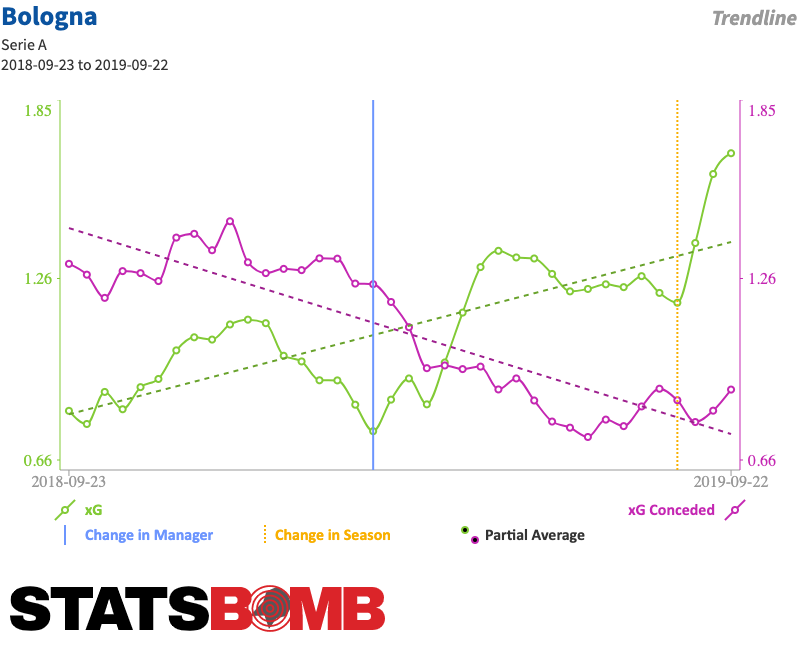 Bologna also brought in reinforcements over the summer to look to capitalize on last season's strong finish and in beginning of the season things have continued to get better. Their performance has improved so much that we could easily consider them the best Italian team after four games, even though they collected “just” seven points. So far just the stellar Guardiola’s Manchester City (3.02) and Borussia Dortmund (2.14) recorded a higher non-penalty expected goals per game average than Bologna (1.92) in the top-5 European Leagues. Yes, read it twice if you don’t believe it. And if set pieces were key in the rise of Bologna's since Mihajlovic's return (they scored nine out of 24 goals this way), this season, while dead balls continue to be important (0.31 xG per game), the Rossoblu are also building a lot of chances in open play. They lead the league in open-play xG (1.61 per game) and xG per shot (0.12). For now, Mihajlovic's team has not even managed to collect as much as it could, since it scored only five goals compared to the 7.75 xG generated. In this regard, it's fair to say that Bologna lacks a reliable finisher. Last season Federico Santander was exceptional at converting headers (3.37 xG, 5 npg) but way below average with every other body part (5.00 xg, 3 npg), and despite an early 27% increase in his shots per 90 average (now at 3.81), his shot quality is too low to suddenly turn him in a 15-goal per season striker. Mattia Destro is not exactly a striker you could rely on for an entire season, although he scored four goals with just 12 shots in 2018/19. Indeed, so far 37-year-old Rodrigo Palacio is the only striker to score at least once. In the long run this could become a serious problem, unless Mihajlovic finds a consistent goal-scoring threat in wide players like Riccardo Orsolini or Nicola Sansone. Moreover, the level of offensive performance of Bologna has certainly been affected by game state and by the fact that on three occasions out of four the Rossoblu found themselves in numerical superiority. They've actually played more than a third of total minutes so far with 11 against 10. Their starting schedule was pretty easy as well. In the first three games they collected four points against newly promoted sides (Hellas Verona and Brescia) and won against SPAL (13th last season). Their first loss came Sunday against Roma, and while it took a 94th minute goal to do it, during the game they fired just five total shots, after averaging 19 in the previous three games. The strength of Bologna's schedule has certainly inflated their numbers in the defensive phase too (third in xG conceded), but Mihajlovic has always built his successes first of all on a solid defense and nothing makes us think that this team is any different.
Bologna also brought in reinforcements over the summer to look to capitalize on last season's strong finish and in beginning of the season things have continued to get better. Their performance has improved so much that we could easily consider them the best Italian team after four games, even though they collected “just” seven points. So far just the stellar Guardiola’s Manchester City (3.02) and Borussia Dortmund (2.14) recorded a higher non-penalty expected goals per game average than Bologna (1.92) in the top-5 European Leagues. Yes, read it twice if you don’t believe it. And if set pieces were key in the rise of Bologna's since Mihajlovic's return (they scored nine out of 24 goals this way), this season, while dead balls continue to be important (0.31 xG per game), the Rossoblu are also building a lot of chances in open play. They lead the league in open-play xG (1.61 per game) and xG per shot (0.12). For now, Mihajlovic's team has not even managed to collect as much as it could, since it scored only five goals compared to the 7.75 xG generated. In this regard, it's fair to say that Bologna lacks a reliable finisher. Last season Federico Santander was exceptional at converting headers (3.37 xG, 5 npg) but way below average with every other body part (5.00 xg, 3 npg), and despite an early 27% increase in his shots per 90 average (now at 3.81), his shot quality is too low to suddenly turn him in a 15-goal per season striker. Mattia Destro is not exactly a striker you could rely on for an entire season, although he scored four goals with just 12 shots in 2018/19. Indeed, so far 37-year-old Rodrigo Palacio is the only striker to score at least once. In the long run this could become a serious problem, unless Mihajlovic finds a consistent goal-scoring threat in wide players like Riccardo Orsolini or Nicola Sansone. Moreover, the level of offensive performance of Bologna has certainly been affected by game state and by the fact that on three occasions out of four the Rossoblu found themselves in numerical superiority. They've actually played more than a third of total minutes so far with 11 against 10. Their starting schedule was pretty easy as well. In the first three games they collected four points against newly promoted sides (Hellas Verona and Brescia) and won against SPAL (13th last season). Their first loss came Sunday against Roma, and while it took a 94th minute goal to do it, during the game they fired just five total shots, after averaging 19 in the previous three games. The strength of Bologna's schedule has certainly inflated their numbers in the defensive phase too (third in xG conceded), but Mihajlovic has always built his successes first of all on a solid defense and nothing makes us think that this team is any different. 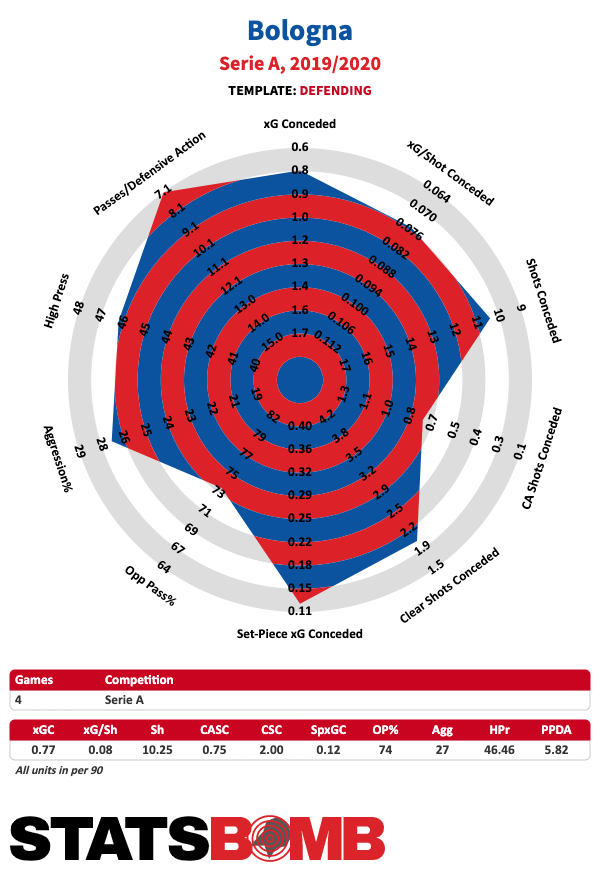 So far, the Rossoblu have shown the ability to dominate lesser opponents, but they also have the weapons to be effective in transition against stronger sides. It is no coincidence that the directness value measured so far for them is the highest in Serie A. As the season progresses and the schedule becomes harder, we could see them settling on a system of play that leads to a less expansive offensive production, but that could still lead them to improve last season's ranking. The outlook for the team seems good and we hope with all our heart that it will be the same for his coach.
So far, the Rossoblu have shown the ability to dominate lesser opponents, but they also have the weapons to be effective in transition against stronger sides. It is no coincidence that the directness value measured so far for them is the highest in Serie A. As the season progresses and the schedule becomes harder, we could see them settling on a system of play that leads to a less expansive offensive production, but that could still lead them to improve last season's ranking. The outlook for the team seems good and we hope with all our heart that it will be the same for his coach.
Should we trust Domenico Berardi?
Staying in Emilia, we cannot ignore how Domenico Berardi got off to a flying start. In just 279 minutes played he's scored five goals, all from open-play. He's already scored more open-play goals than in 2016/17 and 2017/18 combined. 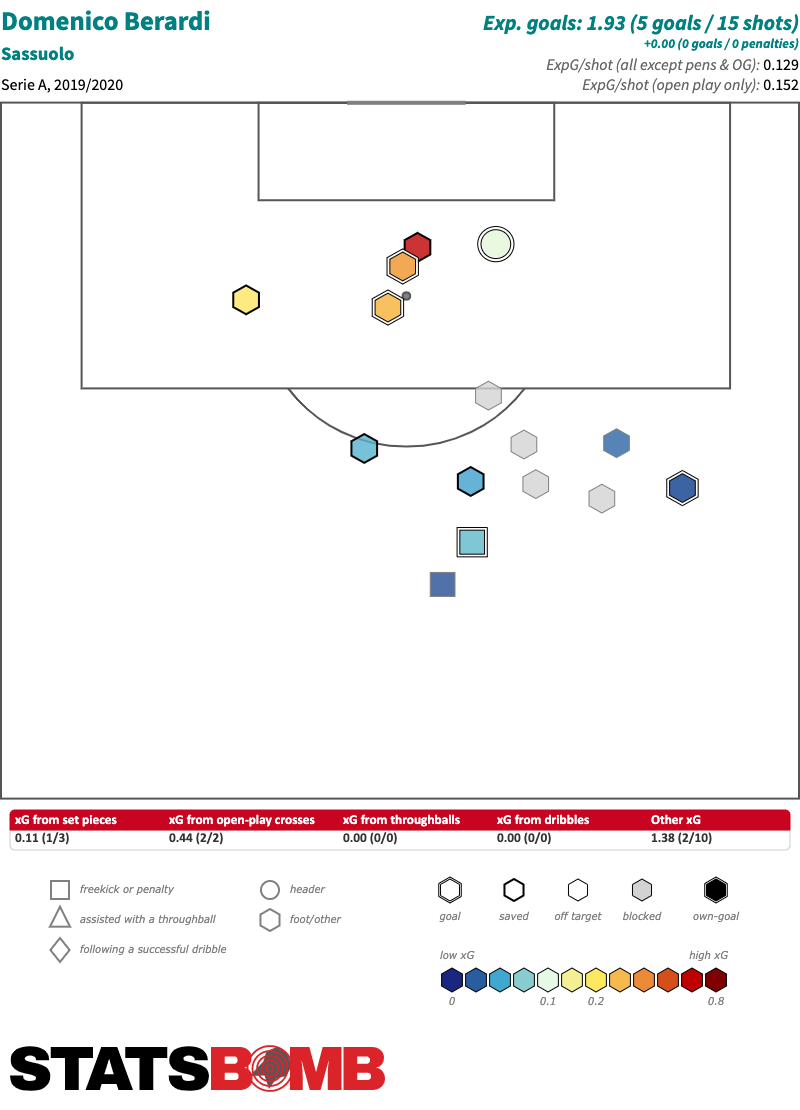 The left-footed inside forward also served an assist that means he was directly involved in 60% of Sassuolo’s 10 goals scored so far (second best attack tied with Roma) even though he missed the first match against Torino due to suspension. Last season, the first under Roberto De Zerbi, Berardi showed some progress with regard to the two previous seasons, but few expected such a start. He seemed to be just another prospect unable to keep his promises. Yet, Berardi was never your average prospect. As a teenager, he scored 31 goals (although 12 from the penalty spot) in his first two Serie A seasons, and he is one of only four players born from 1994 onwards to boast at least 50 goals in the top-5 European leagues along with Kylian Mbappé, Timo Werner and Raheem Sterling. Not bad company. The many penalties scored in the early years of his career have always distorted our perception of his ability as a finisher and perhaps led us to overestimate his ceiling, but so far he has not only been clinical in converting his shots but his-shot selection shot has been excellent, too. His xG/shot has almost doubled up from 0.066 to 0.129. (It's certainly possible that playing four seasons under Eusebio Di Francesco compromised his development on that front) He still tends to shoot too much from outside the box, with the classic movement from the right towards the center of the pitch he does before winding up and unleashing on goal, but for now he leads the league in xG per 90 among players with at least 200 minutes played. However, Berardi has always been a streaky finisher, capable of extraordinary moments followed by games played like he was an ectoplasm. It is therefore very difficult to predict whether he will be able to continue at this rate. What is sure is that he is unlikely to keep a goal/xG ratio above 250% for much longer, but projecting his average xG onto a season and assuming a year finally free of injuries that allows him to at least play as many minutes as last season, he's on pace to score between 18 and 20 goals this season. That's exactly what he would need to boost his career and finally live to early expectations and become one of the best Italian footballers.
The left-footed inside forward also served an assist that means he was directly involved in 60% of Sassuolo’s 10 goals scored so far (second best attack tied with Roma) even though he missed the first match against Torino due to suspension. Last season, the first under Roberto De Zerbi, Berardi showed some progress with regard to the two previous seasons, but few expected such a start. He seemed to be just another prospect unable to keep his promises. Yet, Berardi was never your average prospect. As a teenager, he scored 31 goals (although 12 from the penalty spot) in his first two Serie A seasons, and he is one of only four players born from 1994 onwards to boast at least 50 goals in the top-5 European leagues along with Kylian Mbappé, Timo Werner and Raheem Sterling. Not bad company. The many penalties scored in the early years of his career have always distorted our perception of his ability as a finisher and perhaps led us to overestimate his ceiling, but so far he has not only been clinical in converting his shots but his-shot selection shot has been excellent, too. His xG/shot has almost doubled up from 0.066 to 0.129. (It's certainly possible that playing four seasons under Eusebio Di Francesco compromised his development on that front) He still tends to shoot too much from outside the box, with the classic movement from the right towards the center of the pitch he does before winding up and unleashing on goal, but for now he leads the league in xG per 90 among players with at least 200 minutes played. However, Berardi has always been a streaky finisher, capable of extraordinary moments followed by games played like he was an ectoplasm. It is therefore very difficult to predict whether he will be able to continue at this rate. What is sure is that he is unlikely to keep a goal/xG ratio above 250% for much longer, but projecting his average xG onto a season and assuming a year finally free of injuries that allows him to at least play as many minutes as last season, he's on pace to score between 18 and 20 goals this season. That's exactly what he would need to boost his career and finally live to early expectations and become one of the best Italian footballers.
Milan and Juventus are struggling to create chances
Gennaro Gattuso's AC Milan were a team that tried to dominate the ball, but with a risk-adverse style of play, especially in build-up. We could say that in some cases, possession was first of all a defensive weapon. Their defense was pretty good (they conceded 0.94 xG per game), but with 1.16 xG per game (the same amount generated by relegated Empoli) they finished just 5th. Gattuso was fired at the end of the last season and the management chose Sampdoria’s Marco Giampaolo as a replacement, a coach considered capable of proposing a fun and proactive game, consisting of vertical balls and rapid combinations. For similar reasons, after five victorious years, Juventus decided to part ways with Massimiliano Allegri and replace him with Maurizio Sarri, who like Giampaolo, first began to make his expansive style of play known when he was sitting on Empoli’s bench. Despite the plans, both teams are struggling to create opportunities and the transition to a more proactive style of play is taking longer and more effort than expected. Both teams are recording xG numbers well below league average (1.18 xG per game). Milan (0.89 xG per game) are struggling to find the net so much that they have scored just one open-play goal in four games. Somehow, they still managed to gain six points, but after the defeat in the Derby (in which, in all fairness they showed slight improvements, at least in build-up) the situation is getting more and more difficult for Giampaolo who still has to solve a multitude of tactical questions. At the end of last season Juventus showed a worrying downward trend in their xG production. Sarri hasn't managed to reverse it yet and so far, the Bianconeri are averaging around 20% less xG than 2018/19 (1.04 per game). Still, they have managed to limit the damage, scoring nine goals (four against Napoli) and earning 13 points out of 15 available if we include the match against Brescia played last night. All in all, they've scored just six open play goals in five games, considering they benefited from a penalty against Hellas Verona and two own goals against Napoli and Brescia. If they do not improve, the technical quality of the individual players will not be enough to bring home yet another championship. An ambitious project necessarily requires the patience of the management and the fans I am pretty sure both Juventus and AC Milan’s offensive production will improve in the next few games, but their current situation is an excellent example of how complicated it can be to change a tactical paradigm.
Inter Milan’s defensive strength
Thanks to the contribution of Antonio Conte’s tactics and the arrival of Diego Godín, who now forms with Stefan De Vrij and Milan Skriniar one of the most solid defenses of the championship, Inter Milan have so far conceded only one goal.
Not only does Inter lead the league, with 12 points from four games, but they are also the best team per xG conceded, just 0.59 on average. They have been both the team that conceded the least shots (9.75 per game) and the one the conceded the lowest average shot quality (just 0.06 xG/shot). They also tend to defend far away from their goal with an average defensive distance of 48.29. The schedule has not been particularly difficult for now and the team has still room for improvement in attack. It will be the next matches against Lazio (tonight), Sampdoria and Juventus (preceded by the Champions League match against Barcelona) which tell us if Conte's Inter is for real.
